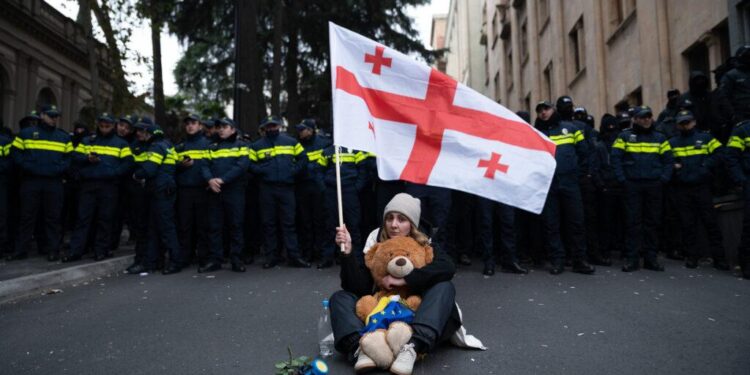Thousands of protesters took to the streets across Georgia this week following the government’s sudden suspension of the country’s bid to join the European Union. The unexpected move has sparked widespread outrage among citizens who view EU integration as a critical step toward democratic reform and economic development. Demonstrators gathered in the capital, Tbilisi, and other major cities, demanding a reversal of the decision and expressing concern over the nation’s geopolitical direction. The protests highlight growing tensions within Georgia as it navigates its complex relationship with both Western institutions and neighboring powers.
Thousands Take to Streets in Georgia Demanding Reinstatement of EU Membership Bid
Massive crowds surged through the capital’s main avenues, waving EU flags and chanting slogans demanding the government reverse its recent decision to halt the integration process. Protestors, ranging from young students to seasoned activists, expressed deep disappointment over what they described as a “betrayal of national aspirations.” The movement highlights a growing rift between the public’s pro-European stance and the political leadership’s cautious repositioning amid mounting geopolitical pressures.
Key demands raised during the demonstrations included:
- Immediate resumption of the EU membership application.
- Transparent government dialogue with civil society.
- Protection of democratic values and judicial independence.
- Renewed commitment to reforms aligned with EU standards.
| Group | Estimated Participants | Main Slogan |
|---|---|---|
| University Students | 5,000+ | “EU or bust!” |
| Political Activists | 3,500 | “Democracy first” |
| General Public | 10,000+ | “Keep the door open” |
Analyzing Government Motives and Public Backlash Amid Rising Political Tensions
The recent government decision to halt Georgia’s EU membership application has sparked widespread outrage across the nation, exposing deep-rooted political rifts and strategic calculations. Critics argue that the move was driven less by pragmatic policy concerns and more by a desire to appease powerful international actors wary of Georgia’s westward shift. Analysts suggest the government aims to maintain leverage in negotiations with Russia and other regional players, prioritizing stability and economic interests over the public’s longstanding aspiration for European integration.
The public reaction has been both swift and vehement, with thousands taking to the streets demanding transparency and accountability. Demonstrators emphasize the right to self-determination and fear that the government’s actions signal a retreat from democratic values. Observers note several core grievances among protestors:
- Loss of trust in political leadership amid perceived backtracking on promised reforms.
- Concerns over sovereignty as external pressures increasingly influence domestic policy decisions.
- Economic uncertainty linked to stalled integration efforts with the EU market.
| Stakeholder | Motivation | Public Response |
|---|---|---|
| Government | Preserve geopolitical balance | Defensive statements, minimal concessions |
| Protesters | EU integration & democracy | Mass mobilizations, calls for resignation |
| International Actors | Regional influence & security | Diplomatic backchannels, muted public stance |
Experts Call for Transparent Dialogue and Policy Reforms to Restore Trust and Stability
Analysts and policy advisors across Europe and Georgia emphasize the urgent need for an open and transparent dialogue between the government and its citizens to mend the deepening divide. They argue that restoring public confidence requires more than mere reassurances; it demands comprehensive policy reforms that address systemic issues and foster an inclusive political environment. Without such steps, experts warn that the nation risks spiraling into prolonged instability, threatening its democratic foundations.
Key recommendations put forward include:
- Establishing independent oversight committees to monitor government decisions related to foreign policy and integration efforts.
- Enhancing parliamentary transparency to ensure laws and reforms receive thorough public scrutiny.
- Facilitating grassroots consultations to incorporate diverse voices, especially from marginalized communities.
- Streamlining anti-corruption measures to rebuild trust in state institutions.
| Issue | Recommended Reform | Expected Outcome |
|---|---|---|
| Corruption Perception | Strict enforcement of transparency laws | Increased public trust |
| Citizen Participation | Regular townhall meetings and digital forums | More inclusive policymaking |
| It looks like your table was cut off after the second data row. Here’s a suggestion to complete it consistently with the style and content you’ve provided: | ||
| Corruption Perception | Strict enforcement of transparency laws | Increased public trust |
| Citizen Participation | Regular townhall meetings and digital forums | More inclusive policymaking |
| Government Oversight | Establishing independent oversight committees | Greater accountability in foreign policy |
















